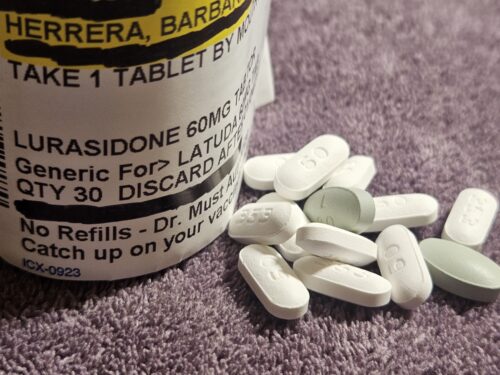For as long as I can remember, Antipsychotic medications have been known to cause weight gain, sometimes an amazing amount of weight. I’ve also learned that some antidepressants and mood stabilizers are also part of the unwanted weight gain psych med team. I want to talk about the impact of weight gain with antipsychotics on a person’s mindset, compliance, and continuation of using these important-for-treatment medications. I will also bring in the GLP-1s and the possible role they might have in helping folks to keep taking their meds instead of stopping them because of weight gain.

Psychotropics vs. Antipsychotics Definition
People who use psychiatric medications often use these two terms interchangeably, but the Antipsychotics are under the umbrella of Psychotropics. There are five different types of psychotropic medications: anti-anxiety medications (aka anxiolytics), antidepressants, antipsychotics, mood stabilizers, and central nervous system stimulants.
I will be focusing in the antipsychotics.

Why Are Antipsychotics Prescribed?
As the name implies, these medications are prescribed for those of us who have or might have psychotic tendencies or experiences. A variety of illnesses might manifest hallucinations including bipolar disorder, delusional disorder, severe depression, paranoid personality disorder, postpartum psychosis, schizoaffective disorder, schizophrenia, or schizotypal personality disorder.
It’s important to know that psychosis on its own is not an illness, but a serious symptom of illness.
Psychosis is characterized as disruptions to a person’s thoughts and perceptions that make it difficult for them to recognize what is real and what isn’t. These disruptions are often experienced as seeing, hearing and believing things that aren’t real or having strange, persistent thoughts, behaviors and emotions.
Psychosis is not always just hallucinations, but can also include:
- Suspiciousness, paranoid ideas, or uneasiness with others
- Trouble thinking clearly and logically
- Unusual or overly intense ideas, strange feelings, or a lack of feelings
- Difficulty telling reality from fantasy
I hover on the border of mild psychosis with ongoing hallucinations no matter what meds I take. I’ve been on antipsychotics almost continuously since 1995 when I had my first horrific manic episode. I have gotten used to the alternating visions, sounds/voices, smells, and touches. They aren’t terrible unless I begin to fall in the depression hole. They are the worst when I am in mania and then the post-mania depression.

Weight Gain with Antipsychotics.
During one of my wild manic times, I was put on Risperidone… Risperdal. Within four months, I gained 80 pounds. I remember it like it was yesterday even though it was 20 years ago. I was kept on Risperdal for a few years, gaining more weight, but not as fast as those first four months. When I went off, I did not lose the weight until now. Of course, I put on much more weight after those initial 80, but that was from having obesity and not having control over eating.
Most antipsychotics cause weight gain. The risk appears to be highest with olanzapine and clozapine. Weight increases rapidly in the initial period after starting antipsychotics. Patients continue to gain weight in the long term.

Why Do Anti Psychotics Cause Weight Gain?
Ghrelin (grell-in), a word many GLP-1 folks already know because GLP-1s act to curb ghrelin from making us hungry.
Ghrelin facilitates the sensations of hunger and fullness, and it promotes fat storage. Levels of ghrelin change significantly throughout the day, increasing when a person is hungry and decreasing after eating.
Ghrelin may act as a signal that stimulates a reward pathway between the stomach and brain. Therefore, it may play a part in hedonic eating, where people consume food for pleasure as opposed to necessity.
Then, when it comes to antipsychotics, they play with the ghrelin secretion and that makes the person hungrier, even if they just ate.
The primary way antipsychotics increase weight gain is by stimulating appetite in patients, so they consume more food. Many people report craving sweet or fatty foods when on antipsychotics. Appetite is regulated by a portion of the brain called the hypothalamus. The hypothalamus integrates information it receives from other parts of the brain and gut-related hormones, such as leptin and ghrelin. Antipsychotics appear to block neurotransmitter receptors in the brain, which is thought to play a part in stimulating appetite and subsequent weight gain.
Now that we know why and how the medications cause people to gain weight, it’s important to know that weight gain is a major reason for not taking one’s medications. Like me!

Non-Compliance with Taking Antipsychotics
When I wasn’t on Risperdal and had another manic episode that lasted four months (yes, documented), I was prescribed Risperdal again. I got the prescriptions every month, but refused to take them. I lied to the psychiatrist saying I was taking them. (Probably why the mania lasted four months.) I just could not handle gaining more weight from that medication. I honestly feel like I was traumatized by the first experience. I was not in a proper state to ask for alternatives. I was asked, “What has worked for you in the past?” and so got the Risperdal. I have since asked my psychiatrist to put in my chart that I want Risperdal as a last resort, to please try other medications, ones that do not cause such drastic weight gain, first.
I am one example of loads of psych patients who are non-compliant with their antipsychotic medications.
Multiple studies have also associated poor adherence with identified weight gain, obesity, or perceived weight status related to taking antipsychotics in both schizophrenia and BD (bipolar disorder).
The main areas I’ve found that encourage non-compliance are:
Body Image & Accompanying Social Aspects – Even though 42% of Americans and about 30% of Canadians and Brits have obesity, our cultures still look down on anyone who isn’t considered thin. If there is weight gain with antipsychotic meds, it exacerbates the inner judgment that often occurs with medication in general; that it is a moral failure to use medications.
If weight gain happens, people have to explain to others why they are adding on so many pounds. Most people would be loathe to disclose their taking or using psych meds to anyone but the closest people in their lives.
Just as those of us who have been losing weight on GLP-1s especially quickly find confusion when we look in the mirror (what I call Body Integration Syndrome, but the DSM-V calls Body Dysmorphia Disorder), the same thing can happen when it goes the other way around, gaining weight.
Lastly, while there are a dearth of studies to be found regarding weight gain and developing an eating disorder with psych meds, my support groups over the last 30 years as well as informal forums suggest this happens more than is spoken about.
Not Knowing This Dramatic Side Effect Ahead of Time – I’ve heard many people in my many different support groups say they were never told about the weight gain aspects of the second-generation atypical antipsychotics. Besides the anger and betrayal issues, many would skip doses or abstain from the medications at all to lower or eliminate the weight gain side effect.
Health Concerns – This is the least common reason in the beginning, but once the client begins gaining weight and medical issues show their face, then they realize there was more than just gaining weight going on or to be worried about. Type 2 diabetes, cholesterol issues, unstable blood glucoses, high triglycerides, insulin resistance, high blood pressure, and metabolic syndrome are the most common weight complications that occur with antipsychotic treatment. While there might be early compliance, once these illnesses show up, compliance often plummets.

How GLP-1s Might Change the Landscape of Antipsychotics
What if there was a way to minimize weight loss while taking antipsychotics? There might be! It is the newer GLP-1s like Mounjaro, Zepbound, Ozempic, Wegovy, etc.
Metformin has been being studied to help with antipsychotic weight gain since 2015. It isn’t uncommon to prescribe Metformin as an add-on to folks taking the atypical antipsychotics.
In one specific review, researchers looked at 20 different papers, studies, clinical trials, and reports retrospectively when looking at GLP-1s. The clients used liraglutide (Saxenda), which is used for weight loss, and exenatide (Bydureon), a medication for Type 2 diabetics, to see how they responded to these two second generation antidiabetics. They also determined that dulaglutide (Trulicity) and semaglutide (Ozempic and Wegovy) were now being examined as well. Tirzepatide (Mounjaro and Zepbound), approved by the FDA in May 2022, was too recent to be examined by these researchers. The assumption, of course, is they will also be a part of the research from now going forward.
Findings were positive when it came to prescribing GLP-1 medications to those taking antipsychotics. Weight was managed more effectively during the first year on their psych meds. They were not able to look further out because of the limitations of the research.
It will be interesting if insurance pays for the weight loss medications (Zepbound and Wegovy) as an add-on even if the person taking antipsychotics doesn’t have Type 2 Diabetes yet or not. A proactive treatment that all people with overweight deserve, but those on medications that almost guarantee metabolic disorders and weight gain definitely have to be examined.

My Last Thoughts
What will it look like in the future for those of us who need to take antipsychotics, especially for long periods of time. I believe that now, if I were to be prescribed Risperdal for my own psychosis, I would be much more likely to take the medication simply because I am on Mounjaro. I am generally a very compliant patient and yes, I know that those in a psych crisis have difficulties functioning with life, much less with the timing of medications, but since so much non-compliance is because of weight gain, removing one obstacle might be a major route to quicker healing from our psychiatric misery.
I look forward to more research on this topic. Not only is it important for all of us, but has a direct impact on my own life… the life I want to save.



I’ve been on several antidepressants, mood enhancers, bi-polar drugs and too many to count. My psychiatrist told me that my weight struggles will always be an issue because of these med and specifically one of the ones I’ve been taking for over 30 years, but no other docs I’ve seen during that time frame never discussed it with me. I’m not battling diabetes and my Primary Care has put me on Mounjaro, which was great! No major side effects and was losing weight as well. I had to switch to Ozempic because I found a group that could enroll me in a plan of getting Ozempic free based on my comorbities and income. Great news, so I started it in September and I’ve lost a lot of weight, except I’m feeling all the side effects of nausea, stomach issues and over all appetite because I’m not hungry, nothing sounds good and I don’t want to get sick. I’m very overjoyed that I qualified for the program but I would rather go back to Mounjaro, is there anything out there similar for it and a pooodible website with information and criteria. If anyone has any information, please let me know!
Linda
I am glad you covered this topic. I’ve been asking in chats about the possibility of these two types of meds being a possible solution to the horrible prospect many of us face when we decide or often have it decided for us that we need to take antipsychotics and somehow live with the benefits of living vs. the detractions of the metabolic downsides. As I am sure you are aware, no real breakthroughs come along often in the treatment of bipolar. I know that this is a tricky population to do studies on, but I hold hope that this might be the breakthrough. Great article.